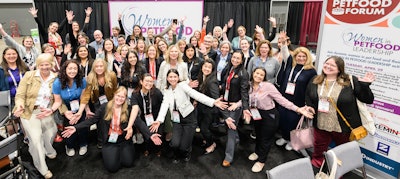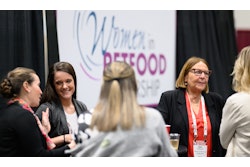
In a candid conversation on June 27 hosted by Women in Petfood Leadership and moderated by Petfood Industry’s Lindsay Beaton, three industry veterans opened up about their mentorship journeys, from overcoming early career challenges in a male-dominated field to becoming the mentors they wish they'd had when starting out.
Gail Kuhlman, PhD, retired technical fellow for Mars Petcare, Betty McPhee, sales manager for Heartland Supply Company, and Laura Moran, founder and CEO of LPM Innovate, shared insights that could help reshape how pet food professionals approach career development and leadership. Their stories reveal not just personal triumphs, but a blueprint for building stronger, more inclusive teams in an industry still evolving toward true gender parity.
The strategic art of mentor selection
Finding the right mentor isn't about networking, it's about strategic career development. These industry leaders emphasized looking beyond titles to identify specific strengths and character traits that align with your growth goals.
"I look for people who do the trait I want to do really well, then those are the people I go to," explained Kuhlman. "Finding a mentor is about being very focused on those areas that I want to grow and develop."
But technical skills aren't everything. McPhee said she looks for mentors who demonstrate integrity across all aspects of their lives. "When I've looked for mentors, I look for people who give to communities, people who are not afraid to volunteer their mind,” she said. “A mentor is somebody that is very grounded in what they have accomplished in their own life.”
This holistic approach to mentor selection — seeking both professional expertise and personal character — is reflective of an understanding of leadership development that goes beyond immediate job requirements.
Breaking through in a changing industry
The pet food industry's transformation over the past few decades mirrors broader workplace evolution, but the journey hasn't been without challenges. All three panelists entered the field when women were significantly underrepresented, particularly in technical and leadership roles.
Kuhlman recalled the early difficulties. "I was very direct, and at that time, women were not very direct," she said. "In fact, many women probably didn’t speak up when they should. It was hard for me to sit in an important meeting and have a voice at the table."
The turning point came through mentorship, she noted. A female vice president at an early job gave Kuhlman advice that transformed her approach. "Stop thinking about changing yourself,” she remembered the woman saying. “Take your talents, take your skills, leverage them and learn how to use them properly. It was probably the best piece of advice I ever received."
That insight — that authenticity trumps conformity — became a cornerstone of Kuhlman's leadership philosophy and illustrates how great mentors help others find strength in their differences rather than encouraging them to fit predetermined molds.
McPhee witnessed the industry's broader transformation. "The entire industry has grown from a place where women had to shy away and be quiet in a crowded room, to now leading the discussion, to owning the discussion,” she said.
The courage to reach out
One of the biggest barriers to mentorship isn't finding willing mentors — it's overcoming the fear of “the ask.” The panelists stressed that mentorship creates value for both parties, challenging the assumption that inexperienced professionals have nothing to offer seasoned leaders.
"I think it's important for people to realize that we all started from nothing," Kuhlman noted. "Mentors and mentees — it's a two-way street. You always learn whether you're the mentee or the mentor."
This reciprocal relationship was evident in Kuhlman's experience with younger team members. "The greatest thing I loved was when younger scientists would ask me to help mentor them in a specific area,” she explained. “I knew that I could get a benefit working with the younger scientist, because they would teach me how young scientists think.”
But timing matters. Moran shared a poignant lesson about the cost of hesitation. She had long admired a woman in supply chain at one pet food company but kept putting off reaching out. "I was like, 'Wow, she doesn't have time for me,’” she remembered. “Then unfortunately, she passed away. So don't repeat my mistake. Go out there and just do it."
Navigating persistent workplace challenges
Despite industry progress, women in the pet food space still face unique challenges that mentorship can help address. The panelists identified several issues that require both individual strategies and systemic change.
Confidence gaps remain a significant hurdle. "I seldom have a guy on my team that won't just apply for a job," Kuhlman noted. "I quite often have women on my team that will come to me and say, 'I'm not really sure if I can do that job ... do you think I could do all those things?' I tell them, ‘You're doing it already.’"
Microaggressions, while subtler than overt discrimination, still undermine women's professional standing. "I think one of our biggest challenges is how to say no in microaggression situations," Kuhlman said. "I still found myself being the one that the table of men ask, 'Hey, would you run out and get that cake for that birthday tomorrow?'"
McPhee developed strategies for maintaining professional boundaries while building respect. "Taking ownership and having confidence are two things that really helped me,” she said. “When somebody would ask me to take notes, I would say, 'You know what, why don't we all put our notes together and everybody can read them,' as opposed to me just sending my notes. I'm not your secretary. I'm here for a purpose, just as you are."
Success redefined: From personal achievement to legacy building
Perhaps the most striking evolution in these leaders' careers is how they've redefined success itself. What began as individual achievement has transformed into a focus on developing others and strengthening the industry.
"Coming into this industry, success for me was me just doing well and being able to retire," Kuhlman said. "But now, I realize it was the impact I had on others that made me really feel successful. I loved watching new people on my team come into the industry, become leaders, and grow and develop."
This shift from self-focused to others-focused success represents a leadership perspective that many professionals don't discover until later in their careers. For these women, mentorship accelerated that understanding and now drives their commitment to developing the next generation.
"For me, it's really about giving back, which is giving back through Women in Petfood Leadership,” Moran said. “It's also giving back through some of the other entrepreneurial innovation mentorships that I do through other universities."
McPhee summarized her transformation: "Starting out, it was about me,” she explained. “Now it's about what I can do for the industry to truly empower women to feel the strength and the self-confidence to get out there and say, 'Yeah, I can do anything I want.'"
Building the future of pet food leadership
As the pet food industry continues to evolve, the need for strong leadership development becomes even more critical. The experiences of these three women suggest that mentorship isn't just a nice-to-have career development tool — it's essential infrastructure for building resilient, innovative organizations.
Their stories also highlight the importance of formal mentorship programs. While organic mentoring relationships are valuable, structured approaches can ensure that more professionals have access to development opportunities, particularly those who might not naturally self-advocate or network effectively.
This conversation between three industry veterans offers a roadmap for cultural change. Their evolution from mentees to mentors demonstrates how individual growth can create ripple effects that strengthen the entire industry.
For pet food professionals at any career stage, their message is clear: seek out mentors strategically, be willing to mentor others, and remember that success is ultimately measured not just by what you achieve, but by whom you help along the way.
If you're looking for support in the pet food industry, Women in Petfood Leadership brings together professional women in pet food to build community through networking, career planning, leadership development and professional support opportunities.
The program is open to all women, and men, who support the principles of cooperation, education, mentoring and encouragement for women to grow professionally throughout the pet food industry. To join this community or see future events and programs, click here.
















